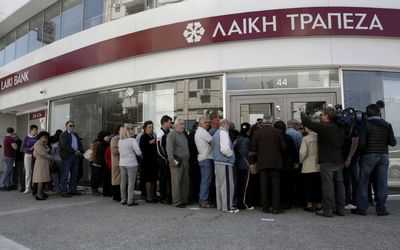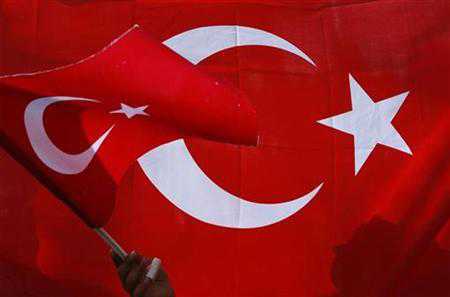AS IT grapples with the prospect of years of economic pain, Cyprus will try to draw strength from its not-so-distant experience of invasion – and the fact that a whole generation knows what it means to rebuild from scratch.
But it is a tough task.

Any inspiration will be badly needed in the small east Mediterranean island nation of under a million people, as even the most optimistic forecasters predict years of recession and sky-high unemployment.
In many ways, the challenge facing Cyprus now, following an international bailout that effectively wipes out a hefty chunk of the banking sector, is more daunting than the events of 1974 when the island was split into an internationally recognised Greek-speaking south and a breakaway Turkish north, following Turkey’s invasion in the wake of an attempted coup by supporters of union with Greece.
The country’s room for manoeuvre is limited, given that it has already largely exhausted the potential for development from a primarily agricultural state.
And any reboot of the economy of the Greek-Cypriot side – the part of the island that has joined the European Union and is afflicted by the recent bailout woes – will have to be done within the limitations of a colossal debt mountain, a collapsed property bubble, a sclerotic European economy and a seeming dearth of international sympathy.
“It’s an economic tragedy this time and the difference is you don’t know where it’ll end up,” said Andreas Georgiou, 80. “This could stir social unrest, people are worried about their families and about putting their kids through school. In 1974, we had support from the outside, our people were willing to go abroad and find work to send money home. But could this happen again?”
After the invasion, Turkey ended up with control of nearly 40% of the island and much of its economic potential.
Greek-Cypriots were largely cut off from the world, losing the deep-water port of Famagusta and the international airport in Nicosia, which has since been home to peacekeeping troops from the United Nations.
The Turkish side also ended up with the bulk of the country’s pre-1974 agricultural base as well as the lion’s share of the burgeoning tourism industry.
And tens of thousands of refugees living in camps had to be rehoused.
The University of Cyprus has estimated that the invasion and division cost Greek- Cypriot individuals and companies over à109-billion.
Despite the economic devastation wrought by the invasion, Cyprus found itself on the mend, at least economically, within a few years of the event as the government backed a series of emergency economic plans with international support.
Between 1976 and 1997 Cyprus was growing at over 6% a year, with tourism at the heart of the economy’s rebirth.
Businesses, big and small, prevailed as many of the country’s youth returned home after getting university degrees around the world, notably from Greece, Britain, and the US.
“A lesson that came out of 1974 was that people learnt that you could lose your property and your money, but if you’ve got an education, you can start again and rebuild,” said James Ker-Lindsay, a senior research fellow at the London School of Economics, who has written extensively on modern Cyprus.
However, one unintended consequence of that drive to educate was the unbalancing of the Cypriot economy away from agriculture and tourism towards financial services, said Ker-Lindsay.
The booming financial sector got a further turbo charge from the collapse of the Soviet Union in the early 1990s, and Russian money – some thought to be of dubious origin – started flowing into the country’s banks, an influx of capital that further unbalanced the economy.
Membership of the EU in 2004 and the adoption of the euro four years later were meant to solidify the country’s advance and set a course for further prosperity.
However, Europe’s debt crisis, and in particular the problems of Greece, tore up the Cypriot economic model and the country eventually had to accept an onerous package of measures to stave off bankruptcy.
– Sapa-AP
* This article was first published in Sunday Times: Business Times
via Cyprus ponders another start | Business Times | BDlive.





